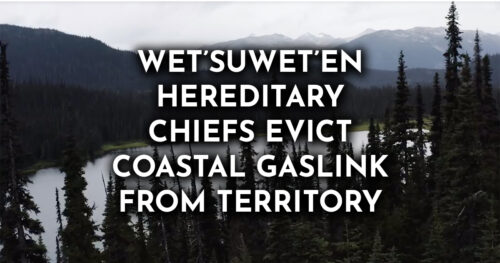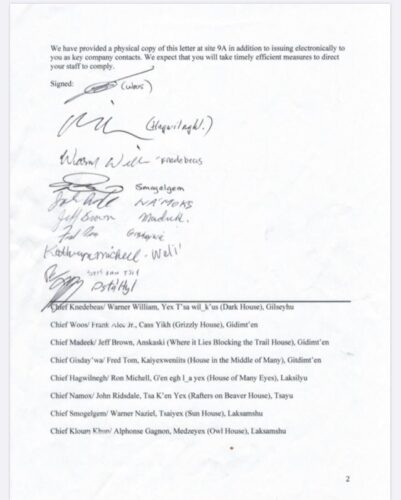Comment by Jan Steinman to the Tyee article below:
I’m not surprised at the BC Supreme Court ruling. It is chock-a-block full of Harper appointees.
[Seven out of nine of the Supreme Court of Canada justices who ruled in Ernst vs AER (seriously jeopardizing it) and intentionally published smears and lies about Ernst, were also appointed by Harper.]
One Year after RCMP Raid, Tensions Rise as Wet’suwet’en Evict Pipeline Company, ‘It’s unnerving that might be our reality again.’ by Amanda Follett Hosgood, Jan 5, 2020, TheTyee.ca
Work must stop on Trans Mountain, Site C, LNG pipeline until First Nations approval, UN committee says, Committee disturbed by law enforcement’s ‘disproportionate use of force, harassment’ against Indigenous people by Laura Kane, The Canadian Press, Jan 07, 2020, CBC News
A United Nations committee working to end racism is urging Canada to immediately stop the construction of three major resource projects in B.C. until it obtains approval from affected First Nations.
The committee on the elimination of racial discrimination monitors a convention to end racial discrimination signed by countries including Canada, and is calling for a suspension of the Trans Mountain pipeline expansion, Site C dam and Coastal GasLink pipeline.
The committee of 18 experts said in a written directive last month that it is concerned by the approval and construction of the three projects without the free, prior and informed consent of impacted Indigenous groups.
It also said it’s disturbed by law enforcement’s “forced removal, disproportionate use of force, harassment and intimidation” and “escalating threat of violence” against Indigenous people.
Trans Mountain Corp., the Crown corporation building the pipeline expansion, said it is approved and moving forward with construction safely and in respect of communities.
BC Hydro said it has been consulting with affected First Nations on Site C since 2007 and has reached benefit agreements [aka bribes] with most of them.
“The [Rule of Law for corporations, the rich, pedophiles, rapists and criminals] Canadian courts have reviewed our consultation with certain First Nations, and found it to be adequate and to have appropriately accommodated their interests,” the utility said in a statement.
“To date, more than $230 million in Site C procurement opportunities has been committed to Indigenous companies. In addition, we have around 400 Indigenous peoples currently working on the project.”
The Canadian government, Coastal GasLink and RCMP did not immediately respond to requests for comment.
The UN committee has previously demanded a halt to the Site C project in in northeast British Columbia, which is opposed by the West Moberly and Prophet River First Nations. However, this marks the first time it has called for a stop to the Trans Mountain and Coastal GasLink projects.
The right to “free, prior and informed consent” to resource projects is part of the UN Declaration on the Rights of Indigenous Peoples (UNDRIP), which Canada has adopted but has not incorporated into law. [of course not, CAPP, corporations and the rich white establishment will never allow it]
The B.C. government has committed to adapt its laws to meet the aims of the UN resolution, but has not yet begun amending legislation.
The UN committee recommends Canada establish a legal and institutional framework to ensure adequate consultation to obtain free, prior and informed consent, and freeze present and future approval of large-scale development projects that don’t meet that level of consent.
… A protest group calling itself the Tiny House Warriors has built tiny homes in the path of the Trans Mountain pipeline on Secwepemc territory in B.C.’s Interior.
The UN committee said it’s particularly alarmed by the reported arrest and detainment of a Secwepemc demonstrator in October.
The committee calls on Canada to immediately cease the “forced eviction” of Secwepemc and Wet’suwet’en people, and guarantee no force will be used against the two groups.
It also calls for the RCMP and other security and police to withdraw from their traditional lands.
All Eyes on Wet’suwet’en: International Call for Week of Solidarity!

TUES JAN 7, 2020 (anniversary of RCMP-CGL raid) until SUN JAN 12, 2020
We call for solidarity actions from Indigenous and non-Indigenous communities who uphold Indigenous sovereignty and recognize the urgency of stopping resource extraction projects that threaten the lives of future generations.
• ───────────────── •
Solidarity actions will be compiled at this Facebook event.
Organize one in your community and email us at email hidden; JavaScript is required to be listed.
• ───────────────── •
Unceded and sovereign Wet’suwet’en land is under attack. On December 31, 2019, BC Supreme Court Justice Marguerite Church granted an injunction against members of the Wet’suwet’en nation who have been stewarding and protecting our traditional territories from the destruction of multiple pipelines, including Coastal GasLink’s (CGL) liquified natural gas (LNG) pipeline. Hereditary Chiefs of all five Wet’suwet’en clans have rejected Church’s decision, which criminalizes Anuk ‘nu’at’en (Wet’suwet’en law), and have issued and enforced an eviction of CGL’s workers from the territory. The last CGL contractor was escorted out by Wet’suwet’en Chiefs on Saturday, January 4, 2020.
We watched communities across Canada and worldwide rise up with us in January 2019 when the RCMP violently raided our territories and criminalized us for upholding our responsibilities towards our land. Our strength to act today comes from the knowledge that our allies across Canada and around the world will again rise up with us, as they did for Oka, Gustafsen Lake, and Elsipogtog, shutting down rail lines, ports, and industrial infrastructure and pressuring elected government officials to abide by UNDRIP.
The state [and its enabling courts!!] needs to stop violently supporting those members of the 1% who are stealing our resources and condemning our children to a world rendered uninhabitable by climate change.
Light your sacred fires and come to our aid as the RCMP prepares again to enact colonial violence against Wet’suwet’en people.
We ask that all actions taken in solidarity are conducted peacefully and according to the laws of the Indigenous nation(s) of that land.
For more information:
Wet’suwet’en Supporter Toolkit

One of the comments to the video below:
About time! So happy and proud First Nations in B.C. are taking a stand and not letting the government and big industry unlawfully steal and occupy their land without prior consent. No means no! Keep speaking your truth, many white Canadians also stand with you.
Esther
Wonderful news! Stay strong Unist’ot’en Camp! The whole world is watching!
Shakanin Maikan
You are standing Strong and protecting your Territory. It is about time that these polluters leave your land and listen to what you’re telling them, that they cannot destroy your land, water, animals and sacred sites. They have to listen to what you say because they are intruders and are trespassing on your lands. If they do not listen then they are criminals and they need to be held accountable. I’m so proud to see the Wet’suwet’en implementing their own Laws and asserting their rights to their land, as they see fit. The government and the corporations have knocked us down in the past, but we are now Standing up, Strong and determined to protect everything we hold dear and Sacred. I Pray for you and I have so much admiration for what you’re doing here. You give us All strength and I Love you ALL. Thank you for being STRONG WARRIORS
Dávid Danos
Good for you! Hopefully the State of Canada and the Province of BC recognise the fact that your territory is a sovereign country. Yin’tah has incredible amounts of rights, rights being bulldosed and ignored by corporate interests. The Country of Yin’tah especially has distinct rights under UNDRIP that BC must now follow, and we cannot wait for an apologetic, in-hindsight court case affirming for the umpteenth time
Tyler_ Lalonde-
You have no right to block or stop your elected council have the green light. If you have problem then take it up with them.
mkinnunen @Tyler_ Lalonde-
The court decision referenced clarified that council only has jurisdiction on reserve land, which is an infinitesimal portion of the land in question. Hereditary leaders maintain control over all unceded territory, which is where they are asserting their sovereignty. UNDRIP further reinforces that right which is why I would guess the workers have left – the injunction is now potentially invalid as it was already in contravention to the established law and now in contravention to UNDRIP legislation that has been passed since the injunction was granted.
Coastal Gaslink Evicted from Unist’ot’en Territory by UnistotenCamp, Jan 4, 2020
Wet’suwet’en Hereditary Chiefs Evict Coastal GasLink from Territory by Unist’ot’en Camp, Jan 4, 2020

FOR IMMEDIATE RELEASE: Smithers, BC
Wet’suwet’en Hereditary Chiefs representing all five clans of the Wet’suwet’en Nation have issued an eviction notice to the Coastal GasLink (CGL) pipeline company. The eviction of CGL is effective immediately, and applies to “Camp 9A” on Dark House territory, as well as the neighbouring Gidimt’en, Tsayu, and Laksamshu clan territories. Hereditary chiefs have gathered on Gidimt’en and Gilseyhu territories to monitor the eviction.
Coastal Gaslink has violated the Wet’suwet’en law of trespass, and has bulldozed through our territories, destroyed our archaeological sites, and occupied our land with industrial man-camps. Private security firms and RCMP have continually interfered with the constitutionally protected rights of Wet’suwet’en people to access our lands for hunting, trapping, and ceremony.
Canada’s courts have acknowledged in Delgamuukw-Gisdaywa v. The Queen that the Wet’suwet’en people, represented by our hereditary chiefs, have never ceded nor surrendered title to the 22,000km2 of Wet’suwet’en territory. The granting of the interlocutory injunction by BC’s Supreme Court has proven to us that Canadian courts will ignore their own rulings and deny our jurisdiction when convenient, and will not protect our territories or our rights as Indigenous peoples.
Anuc ‘nu’at’en (Wet’suwet’en law) is not a “belief” or a “point of view”. It is a way of sustainably managing our territories and relations with one another and the world around us, and it has worked for millennia to keep our territories intact. Our law is central to our identity. The ongoing criminalization of our laws by Canada’s courts and industrial police is an attempt at genocide, an attempt to extinguish Wet’suwet’en identity itself.
We reaffirm that Anuc ‘nu’at’en remains the highest law on Wet’suwet’en land and must be respected. We have always held the responsibility and authority to protect our unceded territories. Protection of our yintah (traditional territories) is at the heart of Anuc ‘nu’at’en, and we will practice our laws for the future generations.
The Wet’suwet’en have always controlled access to our territories. At Unist’ot’en Village, a Free, Prior, and Informed Consent (FPIC) protocol has been practiced over the past ten years whenever access to the territory is requested by someone outside of Dark House membership. Dark House has not been able to implement this protocol since the enforcement of the interim injunction in January 2019. This protocol aligns Wet’suwet’en law with the UN Declaration on the Rights of Indigenous Peoples, which guarantees Indigenous peoples the right to obtain free, prior, and informed consent for development on our territories.
We expect Coastal GasLink to peacefully comply with our eviction notice, and ask that British Columbia uphold its commitment to implement UNDRIP and instruct RCMP to respect our rights and refrain from interference in Wet’suwet’en law.
Media Coordinator
Jen Wickham, Gidumt’en Clan – email hidden; JavaScript is required
(778) 210-0067
View the Letter from Chiefs to Coastal Gaslink:


First Nation issues eviction notice to Coastal GasLink contractors, Hereditary chiefs said staff and contractors were expected to leave the territory immediately by Joel Dryden, Jan 5, 2020, CBC News

A hereditary chief with the Wet’suwet’en Nation said a work site for the Coastal GasLink pipeline near Houston, B.C., has been vacated following the issuing of an eviction notice.
“We’ve tried the avenues available,” said Na’Moks, who also goes by John Ridsdale.
On Dec. 31, a B.C. Supreme Court judge granted Coastal GasLink an injunction against protestors who had blocked access to the project inside their territory.
In a letter issued to Coastal GasLink representatives, hereditary chiefs with the First Nation wrote all staff and contractors must leave the territory immediately.
“Coastal GasLink is in violation of Wet’suwet’en law, and it is our responsibility now to uphold Wet’suwet’en law to maintain the integrity of our territories for future generations,” the letter reads.
Upon receiving the eviction notice, Na’Moks said employees of Coastal GasLink initially reacted with “arrogance and entitlement.”
“But it was explained to them that we are peacefully there,” he said. “We witnessed them leaving, because we were staying there until they did. Then they left, and it was peaceful.
“We sang our songs and drummed and wished them well. These are employees, but we needed to let the decision-makers know that we do not agree with them — we follow our law.”
The company has said it signed agreements with all 20 elected First Nations councils along the path, but five hereditary chiefs of the Wet’suweten First Nation say the project has no authority without their consent.
The specifics of these individual agreements have been kept out of public.
Company requesting to meet with chiefs
In a statement, Coastal GasLink said staff discovered felled trees near the work site on Sunday, making the road impassable.
The company said it was disappointed about recent developments after a year of “successful joint implementation of the access agreement.”
“Our preference has always been to find mutually agreeable solutions through productive and meaningful dialogue,” the statement reads. “We have reached out to better understand their reasons and are hopeful we can find a mutually agreeable path forward.
“To that end, we are requesting to meet with Unist’ot’en and the Hereditary chiefs as soon as possible.”
A spokesperson said despite the notice, construction is planned to resume later this week.
The employees who left the site on Saturday were security staff, the company spokesperson said.
The site has remained vacant since the notice was served, and Na’Moks said he is unsure whether or not the eviction notice will be respected.
“We do expect [RCMP and Coastal GasLink] to meet and discuss things. They’re working hand-in-hand,” he said. “We’re open to meeting with them.”
CBC News requested comment from British Columbia RCMP but did not receive a response Sunday.
Construction on the $6.6-billion Coastal GasLink project started in January 2019.
The pipeline is owned by Calgary-based TC Energy, which agreed to sell a 65 per cent stake in the project to private investment firm KKR and the Alberta Investment Management Corporation (AIMCo) last month. The sale is expected to close later this year.
Expecting further police action
The Dec. 31 injunction effectively restrained protestors from barring workers from getting through checkpoints and allowed RCMP to enforce that ruling.
Saturday’s developments are likely to exacerbate the dispute, but Na’Moks said Wet’suwet’en law — to protect land, people and culture — dictated this move had to be taken.
“We need them to understand that what they are doing is destroying our lands, our ecological sites, our burial sites,” he said. “They have no comprehension of how important it is to our people.”
Fourteen people were arrested in January 2019 when RCMP enforced a court injunction handed down by the same court, drawing international attention.
In December, the U.K. newspaper The Guardian reported RCMP had argued for “lethal overwatch” of the site, according to notes from what was described as a RCMP strategy session.
RCMP were prepared to shoot the activists if necessary, according to The Guardian’s reporting, and were instructed to use “as much violence towards the gate as you want.”
CBC has not independently verified those documents.
When asked whether he was concerned about a similar situation unfolding after the eviction, Na’Moks said his side would be peaceful.
“In January, we were the peaceful ones. We were the ones being invaded. That’s we will continue to be,” he said. “I’m sure they are all meeting today to plan their next steps … Everything they do is premeditated.
“We’ll do it our way, make sure it’s peaceful. We have nothing to hide. We are doing the right thing.”
With files from The Canadian Press and CBC B.C.
B.C. First Nation serves eviction notice to company that wants to build gas pipeline by The Canadian Press, Jan 5, 2020, Vancouver Courier
VANCOUVER — A First Nation in British Columbia has served a company that wants to build a natural gas pipeline through its territory an eviction notice.
“This notice is to inform you that all Coastal GasLink staff and contractors currently trespassing on unceded Wet’suwet’en territory must vacate our territory immediately,” reads a letter from the First Nation’s hereditary chiefs to the company whose $6.6-billion pipeline would transport natural gas across 670 kilometres from northeastern B.C. to the LNG Canada export terminal in Kitimat. article continues below
Coastal GasLink workers and contractors in the area near Houston, B.C., complied with the notice peacefully Saturday night, confirmed two spokespeople for Indigenous groups.
A spokeswoman for Coastal GasLink, Suzanne Wilton, said in an emailed statement that “the only people on site Saturday were security staff.” The company expects construction to resume this week after a holiday break, she wrote.
At first, the workers were reluctant, said Na’Moks, who also goes by John Ridsdale and is the highest ranking hereditary chief of Tsayu, one of the five clans that make up the First Nation.
He estimates it took workers between 90 minutes and two hours to leave.
Coastal GasLink, which did not immediately respond to a request for comment beyond the emailed statement, said on its website that it received the notice.
It “demanded that we remove our equipment from areas in which we are legally permitted to operate,” the company said.
Coastal GasLink also said it was notified on Jan. 3 by Unist’ot’en that the Indigenous group intends to terminate an access agreement effective Jan. 10.
The company’s workers also discovered felled trees early Sunday morning that make a road impassable, it said.
“While it is unclear who felled these trees, this action is a clear violation of the interlocutory injunction as it prevents our crews from accessing work areas,” it said in the statement.
On Dec. 31, the B.C. Supreme Court granted the company an injunction against members of the Wet’suwet’en First Nation and others who oppose the company’s pipeline. [Canadian access to “Justice” – for corporations, largely foreign-funded]
Na’Moks said his group’s position is that the ruling was misinformed.
Coastal GasLink said it was “disappointed” Unist’ot’en decided to terminate the agreement after it was in place for a year and is requesting to meet with the group and hereditary chiefs as soon as possible.
First Nation expects more police action after court sides with natural gas company over pipeline, Wet’suwet’en hereditary chief says nation is exploring options for its own court action by Amy Smart, The Canadian Press, Jan 03, 2020, CBC News

A hereditary chief with the Wet’suwet’en First Nation says the community is expecting further police action after B.C. Supreme Court ruled in favour of a natural gas company that wants to build a pipeline through its territory.
Na’moks, who also goes by John Ridsdale, said he wasn’t surprised that the court granted Coastal GasLink an interim injunction against members of the First Nation and others who oppose the pipeline.
The Dec. 31 ruling came just under a year after the RCMP enforced an injunction granted by the same court that drew international attention with the arrest of 14 people on Jan. 7, 2019.
“We do expect the RCMP to bring it to another level. They did it last year, they’ll do it again this year,” he said in a telephone interview.
The RCMP said in a statement that it respects the ruling and the judicial process, but it would not say if or when police would enforce the latest injunction.
“The RCMP respects the rights of individuals to peaceful, lawful and safe protest and we are committed to facilitating a dialogue between all parties. We are impartial in this dispute and it is our hope that this can be resolved peacefully,” Cpl. Madonna Saunders said.
… The company has said it signed agreements with all 20 elected First Nations councils along the path, but five hereditary chiefs of the Wet’suweten First Nation say the project has no authority without their consent.

Constitutional challenge?
Na’moks said the First Nation is also exploring options for court action, including an appeal of the decision and a constitutional challenge.
“We have a number of avenues open to us that we’re looking at right now,” he said.
The latest ruling expands the existing interim injunction.
Following police enforcement last year, the hereditary chiefs reached an agreement with RCMP that Na’moks said at the time was to ensure the safety of local members. Under the agreement, the company must give the First Nation 24-hour notice of workers entering the site, he said.
‘Our stance hasn’t changed’
The agreement did not represent consent for the project and Na’moks said members remain firm in their opposition.
“Our stance hasn’t changed,” he said Thursday. “Our people have said no to this, so we’ve said no.”
Over the past year, Coastal GasLink has begun what it calls “pre-construction” work at the site, drawing criticism from members of the First Nation who say that work threatens or destroys historic artifacts, trails and hunting grounds.
The company issued a statement following the court ruling saying its work is approved and permitted.
Coastal GasLink will continue trying “to engage with any affected groups to ensure public safety while [its] field crews continue to progress their critical activities,” it said.
Unist’ot’en spokeswoman Freda Huson, who is named in the injunction, said the court decision fails to recognize the authority of Wet’suwet’en law even though the First Nation has never ceded its territory.
According to the decision, Indigenous laws do not become an “effectual part” of Canadian common law or domestic law until there is a means or process to do so that is already recognized by Canadian law, such as through treaties, Aboriginal title declarations in the courts or statutory provisions.
That has not occurred in the Wet’suwet’en case, it said.
Wet’suwet’en title claims have not been resolved by either litigation or negotiation, the decision said.
The court also said some of the constitutional questions posed by the Wet’suwet’en go beyond the scope of the injunction application. It said those questions would have to be determined in a trial.
Huson has lived on the land in question for a decade and what started as a camp now has several permanent structures, including space that is used as a healing centre, which she said she will keep running.
“We’ll continue to exercise Wet’suwet’en law, it’s what has sustained us,” she said.
“We’re not feeling defeated because we know what we’re doing is right.”
TYPICAL NASTY ALBERTA AND AIMCo! AIMCo purchasing equity interest in TC Energy Coastal GasLink pipeline by The Canadian Press, January 2, 2020, Benefits Canada
The company behind the $6.2-billion Coastal GasLink pipeline in British Columbia has made a deal to sell a 65 per cent equity interest in the project.
TC Energy Corp. said in a news release it has entered into an agreement for the sale to KKR & Co. Inc. and the Alberta Investment Management Corp., on behalf of certain of the AIMCo’s clients.
The pipeline’s planned 670-kilometre route from northeastern B.C. to LNG Canada’s export terminal in Kitimat is intended to deliver natural gas to the $40-billion LNG Canada project.
TC Energy also said it expects that once the deal is done, Coastal GasLink will secure financing with a syndicate of banks to fund up to 80 per cent of the project during construction. It said both transactions are expected to close in the first half of 2020, subject to customary regulatory approvals and consents, including the consent of LNG Canada.
Read: AIMCo investing in Alberta pipeline, Caisse taking on shares in mining company
After the deal closes, TC Energy said it will hold a 35 per cent limited partnership equity interest in Coastal GasLink and will be contracted by the limited partnership to construct and operate the pipeline. [What a sleazy operation!~]
“We look forward to establishing a long-term relationship with KKR and the AIMCo as we advance this critical energy infrastructure project,” TC Energy president and chief executive officer Russ Girling said in a news release Thursday. “We remain fully committed to the project and will continue to construct, deliver and operate the pipeline on behalf of the partnership.”
Read: AIMCo enters partnership to build AI, machine learning applications for investment management
TC Energy, formerly TransCanada Corp., announced in 2018 it intended to reduce its interest in the Coastal GasLink pipeline project, and announced last January it hired the Royal Bank of Canada to help it sell as much as a 75 per cent stake in the project.
Construction of the natural gas pipeline, a key part of the multibillion dollar LNG Canada development in Kitimat, led to protests and arrests, although 14 charges were eventually dropped.
B.C.’s top court rules for $6.6-billion Coastal GasLink pipeline, against Indigenous law, Justice rules the natural gas pipeline project has suffered irreparable harm after protestors built blockades to stop work crews by Geoffrey Morgan, January 2, 2020, Leader Post
The Supreme Court of British Columbia has ruled that Indigenous law is not necessarily Canadian law [FRAC’ING WOW! THE COURT’S BIAS IS SO OBVIOUS, JUST LIKE THE BIAS IN THE INJUNCTION GRANTED BY JUSTICE AFFLECK TO PROTECT AMERICAN KINDER MORGAN’S RAPE, PILLAGE AND GREED] in a decision that will enable more construction work on the $6.6-billion Coastal GasLink pipeline despite some First Nations opposition.
B.C. Supreme Court Justice Marguerite Church ruled Tuesday that Coastal GasLink has suffered irreparable [FARCICAL JUDICIAL EMBELLISHMENT?] harm after protestors built blockades and camps to stop work crews from accessing parts of the natural gas pipeline route between Dawson Creek and Kitimat, B.C., where a massive LNG export terminal is under construction.
***
Judicial Appointments Check
Jody Wilson Raybould appointed Justice Marguerite H. Church to her current bench position:
“We know that our country is stronger, and our judicial system more effective, when our judges reflect Canada’s diversity. As promised, we have filled the urgent judicial vacancies by drawing on a list of recommended candidates who are of the highest calibre and who are as diverse as Canada. I have every confidence in the judgment of these appointees and in their commitment – and ability – to deliver just outcomes for [Corporations]
Canadians. Moving forward, we will continue to search for ways to strengthen the judicial appointment process so that it is even more [biased towards oil & gas]open, transparent,and merit-based.”The Honourable Jody Wilson-Raybould
Minister of Justice and Attorney General of Canada
Judicial Appointments Check
***
Church granted both an interlocutory injunction and an enforcement order, which will “provide a mandate to the RCMP to enforce the terms of the order.”
The decision doesn’t spell out what the RCMP can do to enforce the injunction but police have been heavily scrutinized over the past year for enforcing a previous injunction granted by Justice Church against Coastal GasLink protestors.
Last January, RCMP officers enforcing an interim injunction order for Coastal GasLink moved on a blockade, arrested protestors and removed obstacles in what became a nationally televised confrontation.
The case has showcased divisions within some First Nations communities, where elected chiefs and hereditary chiefs sometimes jostle to enforce title rights of parts of traditional territories. [or more accurately are consumed by greed fed bribed (with intent to divide and conquer) by oil and gas companies and corrupt politicians/regulators enabling the bribes]

In this case, Coastal GasLink has signed agreements with elected First Nations groups along the pipeline route, but a group of Wet’suwet’en hereditary chiefs have said they oppose the project and tried to use First Nations law to prevent the company from building the pipeline.
In her decision, Justice Church took issue with various First Nations groups and some hereditary chiefs claiming that Indigenous laws give them legal rights to blockade crews trying to access the area.
“They submit that the plaintiff is in their traditional territory in violation of Wet’suwet’en law and authority and their efforts in erecting the Bridge Blockade were to prevent violation of Wet’suwet’en law,” Justice Church wrote.
However, she also noted that Indigenous laws do not become part of Canadian common or domestic law until they are enshrined through treaties, court declarations, statutory provisions or other means.
“There has been no process by which Wet’suwet’en customary laws have been recognized in this manner,” [for obvious reasons! Canada’s anti-environment, anti-indigenous, anti-community, pro-polluter “Rule of Law” which is controlled by the mostly white, old man, rich, racist establishment keeps intentionally pissing on Indigenous law and the required “process” to respect it] the judge wrote. “While Wet’suwet’en customary laws clearly exist on their own independent footing, they are not recognized as being an effectual part of Canadian law.” [“Effectual” = only when they increase profits for oil and gas companies, including pipeline]
However, the overlap between Canadian law and Indigenous law has not been completely settled and courts across the country have had different opinions on the topic, said Dwight Newman, a law professor at the University of Saskatchewan and the Canada Research Chair in Indigenous Rights and Constitutional Law.
“I think there are some interesting tensions to be sorted out, which is a major issue for Canada in terms of in what ways Indigenous law does or does not become part of Canadian law,” Newman said in an interview.
“In terms of this particular decision, the judge is also saying that there wasn’t very good evidence in terms of what the Indigenous law was,” Newman said, noting the judge found multiple groups claiming rights over tracts of land amid conflicting claims of hereditary lineage.
The group of opposed Wet’suwet’en hereditary chiefs released a statement saying they would reject the Supreme Court decision, which they said has “criminalized” their Indigenous laws.
“We have a responsibility to enforce Wet’suwet’en laws and to ensure the health of our territories for future generations, as we have done for thousands of years,” the statement noted.
Coastal GasLink and some of the opposed hereditary chiefs came to an agreement on a protocol for accessing the area in April 2019, but some protestors have continued to impede work at the site.
Unidentified protestors had previously contravened an interim injunction, Justice Church wrote in her ruling.
In one case, the judge wrote, masked protestors delayed work by “driving a pickup truck into an active work site at a high rate of speed and close to contractors actively working on the road.” [Pffft! Encana workers repeatedly trespassed, raced around on my private property at my home, without obtaining permission, driving haphazardly at high rates of speed, nearly running over my senior dog and nearly driving into my personal belongings, without giving any damn or care.]
For its part, Coastal GasLink said in a release it will continue to “abide by the terms” of agreements it signed with opposed groups like the Unist’ot’en Camp and “will continue efforts to engage with any affected groups to ensure public safety while our field crews continue to progress their crucial activities.”
Order granted vs. opponents of Coastal GasLink pipeline in northern B.C., B.C. Supreme Court grants interlocutory order following protests by Wet’suwet’en First Nation by The Canadian Press, Jan. 1, 2020, Campbell River Mirror
The B.C. Supreme Court has granted Coastal GasLink an interlocutory injunction against members of a First Nation and others who oppose the company’s natural gas pipeline.
The company is building a pipeline from northeastern B.C. to LNG Canada’s export terminal in Kitimat on the coast.
Coastal GasLink says it has signed agreements with all 20 elected First Nations councils along the 670-kilometres route but hereditary chiefs in the Wet’suwet’en First Nation say the project has no authority without their consent.
The court had granted the company an interim injunction last December against pipeline opponents and protests erupted around the world when RCMP enforced it in January, arresting 14 people along a logging road leading to the construction site near Houston.
In her ruling Tuesday, Justice Marguerite Church said Coastal GasLink has the permits and authorizations for the project and has satisfied the requirements for an interlocutory injunction. [“Justice” Wild Wild West Shoot ’em up style]
She said there is evidence to indicate that the defendants have engaged in deliberate and unlawful conduct for the purpose of causing harm to the plaintiff and preventing it from constructing the pipeline.
“There is a public interest in upholding the rule of law and restraining illegal behaviour and protecting of the right of the public, including the plaintiff, to access on Crown roads,” she wrote. [!!!!!!!!!!!!!! Roaring laughter !!!!!!!!!!!!!!!! That’s one of the lamest judicial statements I’ve read yet. Ya, right, Rule of Law for dirty judges; pedophile lawyers; churches enabling raping priests; citizen, landowner, public interest, environment, water abusing authorities like AER and CER; law-violating, lying, blowing up gas well RCMP in cahoots with King Pin Gywn Morgan (ex Encana CEO); corporations – largely foreign-funded; investors; and the rich. Most of the rest of us get abused by Canada’s cost prohibitive “Rule of Law” including 9 supreme court judges knowingly publishing smears and fact fabrication (aka lies) in their ruling in Ernst vs AER]

“The defendants may genuinely believe in their rights under indigenous law to prevent the plaintiff from entering Dark House territory, but the law does not recognize any right to blockade and obstruct the plaintiff from pursuing lawfully authorized activities.” [Pfffft! That same “law” in Canada isn’t even respected or upheld by judges when ordinary Albertans are harmed by the AER, not even when AER violates their Charter rights even though those rights are guarranteed by Canada’s Charter!]
In a statement, Wet’suwet’en hereditary chiefs representing all five clans of the First Nation said they reject the court’s decision.
The First Nation said it is disappointed that the court rendered a decision that contradicts Wet’suwet’en law. “Coastal GasLink has never obtained consent from the Wet’suwet’en Hereditary Chiefs to enter or work on our territories,” the statement said.
“Under the threat of continued police violence, the Wet’suwet’en have complied with the interim injunction order imposed throughout our territories.”
Coastal GasLink said in a statement that it remains focused on constructing the $6.6-billion project safely and with respect to its Indigenous partners and local communities along the route.
The company contends the pipeline will deliver significant, long-term benefits for Indigenous and northern B.C. communities along its path and reduce global greenhouse gas emissions by providing natural gas to replace coal burning in Asian markets. [Nice, if it were true. Natural gas, notably frac’d natural gas which will be shipped in this pipeline, has been proven to be more polluting than coal]
TC Energy [Previously Trans Canada] to sell a 65% stake in its Coastal GasLink pipeline, Sale to KKR and Alberta Investment Management Corporation (AIMCo) is expected to close in early 2020 by Sarah Rieger, Dec 26, 2019, CBC News
TC Energy has agreed to sell a 65 per cent stake in its Coastal GasLink pipeline project to private investment firm KKR and Alberta Investment Management Corporation (AIMCo), the company announced Thursday.
The company said alongside the completion of the sale, it will enter into secured financing with a syndicate of banks to fund up to 80 per cent of the $6.2-billion project’s construction.
“We look forward to establishing a long-term relationship with KKR and AIMCo as we advance this critical energy infrastructure project,” Russ Girling, president and CEO of the Calgary-based company, said in an emailed release.
In January, TC Energy (then TransCanada Corp.) had announced it had hired RBC to help reduce its interest in the project to between 25 and 49 per cent.
The proposed 670-kilometre pipeline will carry natural gas from the Dawson Creek area of northeastern B.C. to LNG Canada’s planned $40-billion export facility in Kitimat.
It has been met with opposition from the Wet’suwet’en Nation, whose territory the pipeline crosses.
The company has said $620 million of the pipeline project’s budget will go to contracts for Indigenous companies, and that the project will create 2,500 jobs over four years of construction. It will transport 2.1 billion cubic feet of natural gas per day.
TC Energy said in conjunction with this sale, it will also give 20 First Nations it’s working in partnership with a chance to acquire a 10 per cent equity interest in the project.
Construction on the project started in January 2019.
The sale is expected to close in the first half of next year.
Alberta pension plan to buy stake in Coastal GasLink pipeline by Jeffrey Jones, Dec 26, 2019, The Globe and Mail (subscription req’d)
Alberta’s public pension manager [AIMCo] is teaming up with one of the largest U.S. buyout companies to acquire a majority stake in the Coastal GasLink natural-gas pipeline from TC Energy Corp., a sign that major investors see a likely go-ahead for the contentious project
Refer also to:

Val Napoleon: Indigenous scholar, law professor at University of Victoria embraces disruption


Oh Racist Fascist Canada! Too late, again. Democracy is dead.
